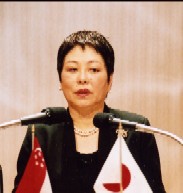��World Refugee Day -Ms. Sadako Ogata and UNHCR ��Office of the United Nations High Commissioner for Refugees)��
June 20, 2007
Ms. Chikako Saito
Certified NPO, Japan Association for UNHCR, Director
 ��Former Vice Representative of Japan Office of UNHCR (United Nations High Commissioner for Refugees)
��Former Vice Representative of Japan Office of UNHCR (United Nations High Commissioner for Refugees)
��Today, June 20, is ��World Refugee Day��. The theme for this year is ��Co-existence��. This is a theme that signifies thinking of refugees who are the victims in regions of conflict in the world, and to co-exist with and share in their pain.
����Inequality�� lies at the root of the refugee problem. The sense of inequality breeds distrust and brings about a condition wherein the neighboring people come to hate one another. This eventually leads to major conflicts and people are forced to abandon their homes and flee across borders.
��There are some 9 million refugees in the world. If those who are made refugees due not only to natural calamities but also those of human-caused calamities are included, the number climbs to 20 million. These 20 million people and more are being aided by a United Nations agency, the UNHCR. These are people who have left their country and are unable to return and are unable to receive the protection of the country they are living in. Moreover, there are those who do not wish to receive the protection of the country. To protect such people is a major problem.
��The number of people without citizenship is growing. Conflicts are not the only cause. During the Cold War, the Soviets sent Russians to various regions where they settled. These people lost a place to return to when the Soviet Union disintegrated. There are some who lost their citizenship or are being forced out of their residences. These types of issues are surprisingly not well known.
��Today, I would like to introduce Ms. Sadako Ogata, a woman who is engaged head-on with such issues.
��Ms. Sadako Ogata went to the United States in 1951 as the Second Rotary Fellow. 1951 was also the year when the Office of the United Nations High Commissioner for Refugees began their activities.
��When Ms. Ogata became the 8th High Commissioner, I was a public relations officer at the Japanese office of the UNHCR.
��In the fall of 1991, around the time of the Executive Committee meeting, Her Highness the Queen of Norway and Princess Diana of the UK visited refugee camps.
��Princess Diana, listening to the explanations given by High Commissioner Ogata and seeing the refugee women living and active, inquired, ��Amidst such a dire situation, how can the women be so active?�� High Commissioner Ogata responded in a forceful manner, ��Mothers are always strong.�� What was particularly impressing was that Princess Diana nodded strongly and said with a smile, ��If there is anything that I can do, please tell me.��
��The refugee problem, like the environmental issues and HIV issues, is one that must be solved on a global level.
��People who do not have much knowledge about refugees say that they became refugees out of their own volition, or they crossed the border just to receive aid. This is just not true. Among the refugees that we have come across, there were university professors, judges, doctors, and businessmen. Even such specialists can be made a refugee. These are people who had no choice but to cross the border. They are making efforts to find some way of returning to their country.
��During the time of Ms. Ogata��s appointment, a mission including some 20 members from the Japan Federation of Economic Organizations visited a refugee camp in Africa. It is located at Dadaab, Kenya. We guided them to a Somali refugee camp. When the group leader Shoichiro Toyoda looked at the camp, impoverished mothers and children were sitting in an empty tent clothed in tattered clothing. Mr. Toyoda froze in his steps and without a word looked at me.
��I want him to understand that they are not poor because they are in Africa and that they abandoned their homes and became a refugee and crossed the border because circumstances forced them to. 16 years have passed since then. There is a feeling that interest in the refugee problem may have waned a little, but I wish for support from everyone once again.
��Please visit the homepage on the Internet.
URL: http://www.japanforunhcr.org/